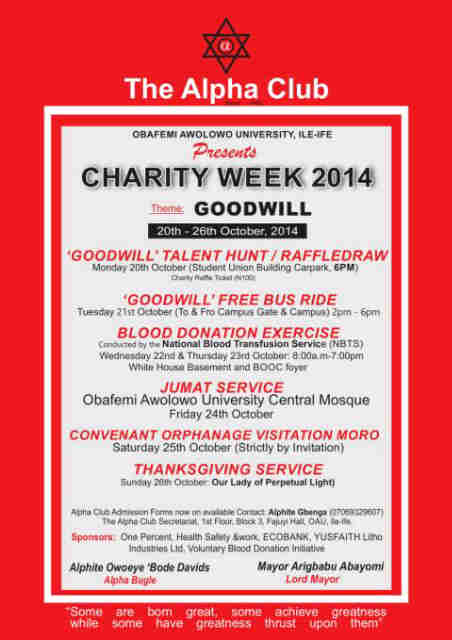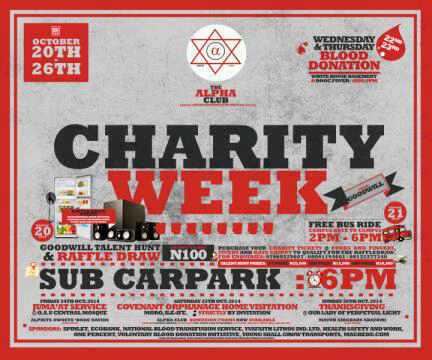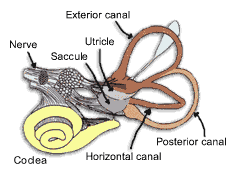BRIEF INTRODUCTION AND PROFILE OF THE ALPHA CLUB
The Alpha Club is a socio-cultural, philanthropic and charitable organisation founded in 1968 in the then University of Ife now Obafemi Awolowo University Ile-Ife with aims and objectives which encompass the breeding of young men into responsible and respectable citizens, acquainting them with charitable works and other activities, which foster peace in our immediate and larger world. Because of her socio-cultural and philanthropic outlook, the club organizes programmes that bring youths together in constructive activities.
OUR PEDIGREE – We pride ourselves as having the best of gentlemen as our Graduate Alphites, patrons and Fellows. Amongst great men that have been rolled out of the stables of Alpha club are: Mazi Sam Ohuabunwa, the current president/CEO Neimeth International Pharmaceuticals Plc., who was the Lord Mayor of the club in 1975; Prince Oluseyi Lufadeju, the MD Shelter Initiatives who was social scribe in 1968; Senator Mike Ajeigbo, the MD/CEO Minaj Group of Companies and former Chairman Senate Committee on Judiciary; Mr. Adewale Adeniyi, the former Auditor General of Ondo State, who was the Exchequer of the club in 1971; Mayor (Professor) Dibu Ojerinde, the current Registrar of Joint Admission Matriculation Board (JAMB) who was the Lord Mayor in 1973; Prof. Olu Adediran, Dean, Faculty of Law, OAU who was the scribe in 1974; Mayor Araba Oladokun a former Registrar of LAUTECH, Ogbomoso who was the Lord Mayor in 1971; Mayor George Irechukwu, Commissioner of Finance, Imo State who was the Lord Mayor in 1984. Mr. Seye Kehinde, Publisher City People Magazine; Mr. Dele Oduwale, CEO Desh Petroleum and Chicken Lovers Restaurants; other eminent great men make the row call of fellows and patrons- Chief Gabriel Igbienidion (Esama of Benin Kingdom), Chief The Hon. Sir Alex Akinyele (Elder Stateman, former Chairman National Sports Commmission), King Sunny Ade – An Ace musician, Major David Ejoor, former Chief of Army Staff and former Governor of Mid-Western Region. Fellow Ben Omonua, MD BankPHB Asset Management Chief R.A. Williams, Mr. Ademola Adeyinka, Engr. Obi Anadu – G.M. Land and Waters, Muritala Mohammed International Airport- the list goes on. All these eminent personalities are still in contact with the Club. This list is in-exhaustive and as you traverse the country and indeed the world, you will find Alphites in all facets of life, helping to make the society better than they found it.
We are “gentlemen of distinction” with an unyielding belief in the time tested saying that “Some are born great, some achieve greatness while some have greatness thrust upon them” and in humble pursuit of greatness in honour, our philosophy and outlook, the club organizes programmes that bring youths together in constructive activities. As such, one of her programmes is “The Annual Charity Week”.
THE ALPHA CLUB’S CHARITY WEEK
The Charity Week is an entire week of activities organized by the Alpha Club and dedicated to charitable endeavours, the idea is to create awareness, promote and encourage charitable works amongst the staff, students, residents and visitors in the OAU community and its environs.
The programme is also intended to launch the community project series that the club will be embarking upon which is aimed at improving the state of the OAU community through works of Arts, Technology and encouraging research.
The next edition of this customary event tagged “GOODWILL” will be held in October 2014. It will span a whole week as highlighted above and will include free health services, a social event, material / monetary donation, drug donation and a blood donation exercise that will feature the officials of the National Blood Transfusion Service, Ibadan; Family Health International (FHI), and Global HIV/AIDS Initiative Nigeria (GHAIN), one percent, Voluntary Blood Donation initiative (VOBDI) among several others. The event promises to be very exiting and to create an atmosphere where love is shared and the message of charity is sung as morning hymns in the hearts of the citizens.
The events aligned for the charity week are as follows:
Monday- “GOODWILL” talent hunt and raffle draw
Tuesday- Free Bus Ride
Wednesday & Thursday- Blood Donation Exercise
Friday- Jumat service and Visit to a motherless Babies’ Home
Saturday- Alpha Fellowship
Sunday- Thanksgiving at Our lady’s of perpetual light
DETAILS OF EVENTS
MONDAY
“GOODWILL” Talent Hunt and Raffle Draw
The First day of the week is set aside in this year’s charity week for a social event “Talent Hunt and Raffle Draw”. This event is strategically placed so as to publicise the forthcoming blood donation. It is focused on creating a high level of interaction amongst students thereby creating a lasting and enduring awareness in the minds of people for the Blood Donation.
The event will feature a talent hunt whereby registered participants will be allowed to showcase their talents and entertain audience and 3 winners will be picked to given a cash prize of 20,000naira, 15,000naira and 10,000naira for 1st, 2nd and 3rd positions respectively.
Furthermore, along the line, a raffle draw exercise will take place as interludes at specific times. Participants in the raffle draw would ave purchased a raffle tickets at 100naira only. Lots of prizes like Fridges, microwaves, home theatre systems, goody bags, standing fans will be won during the exercise.
TUESDAY
FREE BUS RIDE
Due to the usual rush which occurs in the early hours of the morning and often after lectures in the afternoon, students often miss out or go late for lectures or end the day in frustration.
During the week, the club would seek to alleviate this problem by providing buses at strategic locations (school gate or halls of residence) to convey students free of charge to and from the school premises for the periods which the rush shall prevail. This also serves publicity purposes for the Charity week as a whole and the blood donation more importantly.
WEDNESDAY AND THURSDAY
BLOOD DONATION EXERCISE
This is the hallmark of events of the week because of importance of blood in saving lives as many have come to give testimonies. The Alpha Club has, for over 3 decades been organising blood donation to the O.A.U.T.H.C. Ile-Ife and the National Blood Transfusion Service, with 490 pints donated in the last edition and over 2500 pints of blood donated till date. This year the event would be organised by the Alpha Club in conjunction with experts from the National Blood Transfusion Service. Blood donors are given packages which include haematinics to help replenish the donated blood and other complimentary gifts.
BLOOD DONOR PACKAGE
Haematinics – blood capsules, multivitamins,
Glucose
Beverage
Milk
Eggs
T-shirts
Stickers
Other items to be included by your organization & other sponsors.
FRIDAY
JUMAT SERVICE AND VISIT TO THE MOTHERLESS BABIES’ HOME
We conventionally visit the mosque every friday of the charity week to give thanks to Almighty God for a successful week. After this, we set out for a chosen motherless babies’ home in Osun state to give out materials, food stuffs, clothings, etc, some of which would have been gathered before and during the course of the charity week.
SATURDAY
ALPHA FELLOWSHIP
We believe that after a week long of selfless service to humanity, members of the Alpha Club “Alphites” should also relax at some point. So we organize a mini event with our spouses, where we relax and also rejoice with ourselves on the success we have achieved during the week. We also sometimes involve the public in this, a few of our blood donors might be invited during thid event to celebrate with us.
SUNDAY
THANKSGIVING SERVICE AT THE CHURCH
We also after visiting the mosque, visit the Church to praise and thank God for making our charity week a complete success.
twitter.com/tom_olas
facebook.com/tomiwaolasiyan








